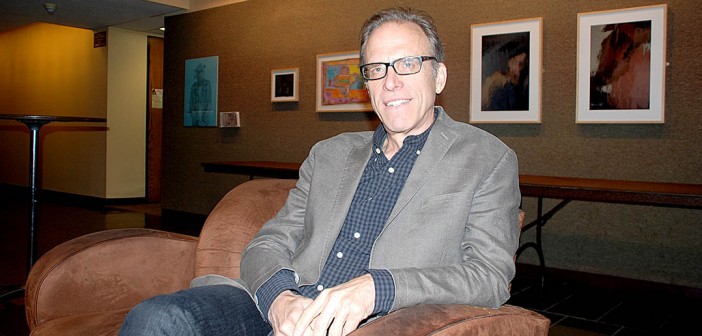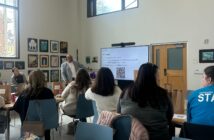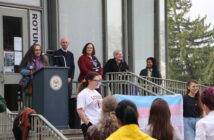Kirby Dick is the writer and director of “The Hunting Ground,” a documentary that explores sexual assaults on college campuses and administration cover-ups.
Q: Did any of your other documentaries that dealt with sexual assault, such as “The Invisible War” and “Twist of Faith,” influence your decision to explore sexual assault on college campuses?
A: “The Invisible War” certainly had an influence on it because I made the film with my producer Amy Ziering and that film was about rape in the military. As part of kind of getting it out, we were taking the film to college campuses. In the Q&As that followed, the conversations would often quickly turn from rape in the military to rape on college campuses. We knew it was an issue, but we were kind of surprised that it was that much of an issue. Then we started getting letters and emails from people – often times survivors of sexual assault on college campuses – imploring us to make the film. So, it just seemed like this was a film we had to make. We put aside our other film, which had nothing to do with sexual assault and dove into this one.
Q: How did investigating sexual assaults on college campuses differ from your investigations in your previous films? What kind of push-backs or cooperation did you encounter from administrators?
We got very little cooperation from administrators. For the most part, we were operating a lot under the radar, until near the end when we asked many college presidents to interview on camera. It was really surprising how fearful faculty and administrators were to talk about this issue—even if they knew a lot about it, even if they knew it was a real problem, even if their position was something like victim advocates helping survivors. There was a fear that there would be some sort of retaliation from the college or university. I was really surprised because I guess I just saw colleges and universities as free speech zones—that people would be willing to speak out about this. In many cases, faculty do speak out about sexual assault in other places around the world, even around the country, but on their campus – it was an incredible amount of silence.
Q: You’ve been screening the film at colleges and universities across the country. What has the response been from both students and administrators?
From students it has been overwhelmingly positive. One of the ways I judge how engaged administrators are on this issue is how many show up at the screenings. I think that sends a real message to the school, to the students and even to the community that they really want to provide leadership on this. I was at Fresno State, where there were 400 people and not one administrator in the room. Yesterday, being at Lafayette, the president came, which was a really good sign. It’s challenging, but if administrators aren’t willing to engage in the conversation, the problem is just going to continue.
Q: Recently, there’s been a lot of backlash about possible inaccuracies in the Rolling Stone article about the University of Virginia. How do you balance maintaining journalistic accuracy when exploring such a sensitive issue?
I think when you’re reporting on these kinds of things, you have to be very thorough—we certainly were. For all the major stories in our films, we have thousands of pages of documents collectively to back up what our subjects said. Another major difference between the Rolling Stone piece and this piece is their primary subject is anonymous and in our film everybody is on camera, identified. There’s no question that there were reporting problems with the Rolling Stone story. I think that we really have to keep in mind that that’s one story on one campus. The much larger and the much more important story is the fact that this is going on in nearly all campuses across the country. As important as the coverage of the Rolling Stone’s flaws was, I think we as a culture really need to move beyond that now and really focus on the problem at hand.
Q: Was there anything you found while making this film that you found particularly surprising?
I was surprised that it was so ubiquitous. It seemed like every college campus where we interviewed a survivor, not only was it happening but the school in almost every case was not responding properly. In so many cases they were blaming the victim and actively trying to cover up the fact that sexual assaults happen on their campuses. The other thing that I found surprising was that you could walk on any college campus with a substantial amount of fraternities and start asking students which house or houses have a reputation for sexual assault and very quickly find that out. So if somebody just coming on campus can do that and find out in an hour, you know the administration knows about it. My question to them is what are they doing about that. These are places where often times new students are going to have parties and they have no idea that they have a reputation for sexual assault.
Q: Is that something you found in most of the places you went to?
We’ve found that on most campuses there is at least one house that tends to have a reputation of sexual assault. Most men in fraternities are not rapists and most men are horrified by this. But we haven’t seen the leadership from either the national fraternities or most local houses toward addressing this issue. Particularly the national fraternities have just been completely absent. It’s all about trying to avoid liability, avoid any kind of responsibility—I think that’s very very shameful. They are very aware that this is a problem and they’ve done nothing about it, and I really think they should be called out on this.
Q: What has the male reaction to the film been? Have you see a lot of men showing up to the screenings?
We are seeing more than we did with the “Invisible War,” which is a good sign. We’ve screened where we’ve had fraternity members come up and thank us for making the film and say that they’re so glad the film was shown at their school because it’s an issue there. They’re very proud of their fraternities and they hope that this film helps to address this issue because they don’t want assaults going on at fraternities on their campus.
Q: What actions do you think colleges, as well as students can take to start combating this issue?
I think colleges are slowly moving in the right direction but I think they have a long long way to go. I think all schools have many more reforms that they should undertake and they should be including the activists and the survivors in that process. If they’re not, those reforms will fail and the problem will continue. Also, schools should be doing climate surveys—anonymous surveys of the students to find out what the prevalence of sexual assaults is and how comfortable they feel coming forward. They should distribute the results of those publicly. And if they’re not doing that, then they are actively covering up important information that everyone needs to know.






Comment policy
Comments posted to The Brown and White website are reviewed by a moderator before being approved. Incendiary speech or harassing language, including comments targeted at individuals, may be deemed unacceptable and not published. Spam and other soliciting will also be declined.
The Brown and White also reserves the right to not publish entirely anonymous comments.